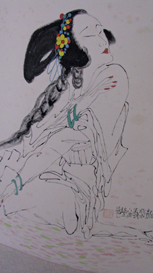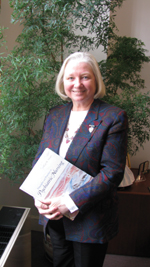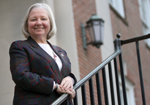|
by Dawn
Brazell
Public Relations
Hanging in Gail
Stuart's office is an elegant art
piece of an Asian woman.
She laughingly
calls it her muse, and it brings
back fond memories of an overseas
trip she took. More than that it
embodies visually her goals of
instilling compassion and
self-efficacy in the students and
faculty who traverse the halls of
MUSC's College of Nursing where
she has served as dean for the
past decade.
"I love seeing
minds blossom," she said of the
journey she witnesses of the
students, staff and faculty in the
college. "It's very much a visual
thing where you see the flower
opening up, particularly in
nursing. You see people come in
here and they just bloom. They
take in information. They have
insights they never had before.
They have new ways of reaching out
to people."
 Dr. Gail Stuart draws
inspiration from art, such as this
image that hangs in her office. Dr. Gail Stuart draws
inspiration from art, such as this
image that hangs in her office.
Stuart, Ph.D.,
R.N., has seen many positive
changes. The college boasts a 92
percent graduation rate for
2010-11 and a 99 percent pass rate
on the registered nurse licensing
examination in 2011. It has
doubled student enrollment and
gone from having no National
Institutes of Health ranking for
research to being ranked 30th in
the country. It also has added to
its online nursing programs.
Though all are
welcomed changes, they are not
what stand out to Stuart.
"I'm proudest
of the emotional climate in this
college. That's probably not what
you'd expect a dean to say. I'm
proudest of the fact that in the
MUSC Excellence survey, 97 to 100
percent of the faculty and the
staff said they made the right
choice in coming to work at the
College of Nursing. If you have a
healthy emotional climate and
respectful culture, you can truly
do great things."
Many times
organizations do good things, but
they foster a competitive,
cutthroat climate that is not
healthy.
"Ultimately,
that's not going to win the day.
We are a team. The more stars that
shine, the greater the light
that's given out. It's not about
individuals. It's about all of us
growing to be the best that we can
be."
Her relational
style of management that blends
the art and science of nursing is
one factor that has made Stuart
stand out in her role as dean. She
is being recognized as part of the
MUSC's National Women's History
Month program in March celebrating
"Women's Education – Women's
Empowerment."
Stuart has had
many offers during her career to
move on to other institutions. She
has stayed because her continuity
has allowed her to develop good
working relationships and gain
momentum to effect change. "I'm
someone who likes to grow and
develop things. I like to see the
possibilities. I think MUSC is
uniquely positioned to grow."
Jersey Girl
Born in Jersey City, New Jersey,
Stuart lived in a fourth-floor
apartment with no elevator. "I
don't think I ever saw a riding
lawn mower. I was a real city
girl. I went to the Village on
weekends. I was very much brought
up in the New York City
environment."
Not many
fields were open to women as she
was considering college.
"I have a
confession. I type with two
fingers because when I was growing
up you took typing if you wanted
to be a secretary. I knew I wanted
a college degree, so I went to
Georgetown University, which was a
fabulous experience."
Nursing turned
out to be the perfect match for
her. She loved the holistic view
and ability to interact with
patients. After receiving her
Bachelor of Science degree in
nursing from Georgetown
University, she went on to get her
master's in psychiatric nursing
from the University of Maryland
and her doctorate in behavioral
sciences from Johns Hopkins
University, School of Hygiene and
Public Health.
Stuart said she
realized she was drawn to
psychiatric nursing while working
in the emergency room at George
Washington University Hospital.
"What I noticed is that every time
someone came in with an overdose
or suicide attempt of any kind,
the staff always used to triage
those to me. I started thinking
maybe there was a reason why they
don't want to do it, and I liked
working with those patients."
Stuart would go
on to make major contributions to
psychiatric mental health nursing.
She is finishing the 10th edition
of the textbook, "Principles and
Practice of Psychiatric Nursing,"
that has been honored with four
Book of the Year Awards from the
American Journal of Nursing and
has been translated into six
languages.
The book goes
beyond the science of nursing to
capture the artistry involved as
well. Stuart said she carefully
chose patient and nurse stories.
It also includes the work of batik
artist, Mary Edna Fraser.
 Dr. Gail Stuart
holds her latest psychiatric
nursing textbook. Dr. Gail Stuart
holds her latest psychiatric
nursing textbook.
"What I most
enjoy about writing the book is
the sense of generativity — of
giving back. It's a legacy.
Clearly, it won't be forever, but
it's been 30 some odd years and
there are a lot of people who have
been touched by the content. It's
more than just numbers and facts.
It really tries to humanize the
whole mental health and substance
use field. I think people relate
to that. People love stories, and
it makes it more personal."
Risk Taker
Though she now has one grandchild,
whom she loves spending time with,
Stuart said she has much she wants
to accomplish before retiring.
She's excited about the renovation
of the college that will be
starting in the fall.
She also likes
that three of the six deans at
MUSC are female. There was a
period when she was the only
female dean. "It makes the
dialogue more balanced and gives
more perspective. It enriches MUSC
overall with the kinds of
discussions and analysis that can
be achieved when you have a mix of
people – racial, ethnic, gender –
however you want to look at it.
Like minds always think the same
way, and you go down the same
road."
There's still
work that needs to be done to
mentor women in leadership roles.
"Women have not yet won the day.
There still are challenges. There
are a lot of subtle and
unexpressed biases. I don't think
women have been totally unleashed
as far as the potential that they
can really bring into the
workplace and the workforce."
Her advice to
women is to ignore some of the
negative images that can surround
working women and find creative
ways to balance family and career
work. There's an art in learning
to be true to oneself, she said.
"Don't
second-guess feelings important to
you and let the outside voices
override your own voice.
Experiment. I think that's very
important. Experiment with
childcare arrangements. Experiment
with careers. I've told people
that I've had more different jobs
without leaving Charleston since I
was here. I was over at
psychiatry. I was at the center
for health care research.
Sometimes certain things work at
one point in time and then they
don't work at another. When a
window of opportunity opens, go
for it. Take the risk."
Pragmatic to
the core, Stuart exudes
resiliency.
"You have to
adapt and change as your situation
changes. This shouldn't be
frightening. It shouldn't be a bad
thing. It should be experimental.
I tell my faculty there is no
failure here. If we try something
that we all thought was a good
idea and it doesn't work out, we
are smarter than we were the day
before. It's like a rule-out
diagnosis. I think that's how
women have to feel. I think
oftentimes women feel more
constrained and held back and less
able to take risks."
She also
believes in being proactive.
Stuart said she's not the type to
wring her hands or whine.
 Dr. Gail Stuart just
returned from Liberia where she is
working with the Atlanta-based
Carter Center on an initiative to
create a sustainable mental health
system. She developed a
"train-the-trainer" program for
registered nurses to address the
area's dire need for mental health
professionals. Dr. Gail Stuart just
returned from Liberia where she is
working with the Atlanta-based
Carter Center on an initiative to
create a sustainable mental health
system. She developed a
"train-the-trainer" program for
registered nurses to address the
area's dire need for mental health
professionals.
"I really don't
like whining at all. I don't like
worrying about things you can't
change. I don't find that
productive. There are plenty of
things to worry about that you can
change — concentrate on those. I
tend to be optimistic and
persevering. If I believe in
something, I pursue it. If you
close the front door, I'm very
likely to go to the back door and
see if that's open."
The college is
on a very positive trajectory, and
she wants to continue to see an
increase in students and in the
research agenda. Her goal is for
the college to be one of the best
state-supported schools in the
country — in the top tier of its
peer group. More importantly, she
wants its graduates
to have mastered the two traits
that in her book are essential to
success: Compassion and
self-efficacy. With those two
qualities, they can handle any
situation.
"Sometimes I
see the work of our students and I
think 'you make me so happy for
the future of nursing.' I know
that's the kind of nurse I want at
the bedside, in the community and
in the boardroom. It gives you a
sense of longevity and a sense of
hope in the future. Sure times are
tough and sure there are huge
challenges ahead, but I am proud
that here in the college, we are
graduating dedicated women and men
whom I would want to be my nurse."
|



 Dr. Gail Stuart draws
inspiration from art, such as this
image that hangs in her office.
Dr. Gail Stuart draws
inspiration from art, such as this
image that hangs in her office. Dr. Gail Stuart
holds her latest psychiatric
nursing textbook.
Dr. Gail Stuart
holds her latest psychiatric
nursing textbook. Dr. Gail Stuart just
returned from Liberia where she is
working with the Atlanta-based
Carter Center on an initiative to
create a sustainable mental health
system. She developed a
"train-the-trainer" program for
registered nurses to address the
area's dire need for mental health
professionals.
Dr. Gail Stuart just
returned from Liberia where she is
working with the Atlanta-based
Carter Center on an initiative to
create a sustainable mental health
system. She developed a
"train-the-trainer" program for
registered nurses to address the
area's dire need for mental health
professionals.